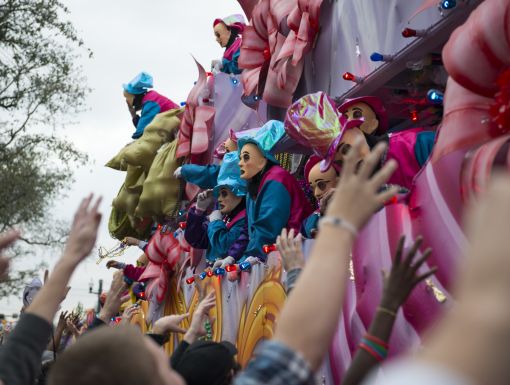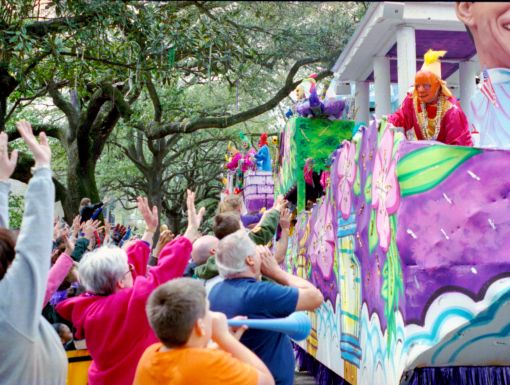
Concussions at Mardi Gras: Expert Tips for Protecting Yourself
In New Orleans, Mardi Gras is the most festive time of the year. The parades, food and laid-back atmosphere make it a celebration like no other. It is a time for joy, community and making memories that last a lifetime.
However, during the excitement of float riders tossing throws and crowds cheering for their favorite krewes, accidents can happen. Some of the things that make Mardi Gras fun, such as scrambling to catch parade throws can also lead to injuries. One common injury during the season is a concussion, often caused by a trip or fall, a tumble off a float or a head injury while grabbing for that shiny pair of beads.
By taking a few simple precautions, you can keep the good times rolling safely.
What is a concussion?
A concussion is a type of brain injury that happens when you get hit on the head or your body is jolted hard enough to make your head move quickly back and forth. This sudden movement can make the brain bounce or twist inside the skull, which can lead to changes in the brain and sometimes damage brain cells.
Although concussions are often linked to sports like football, they can happen anywhere, even during a parade.
What are easy ways to minimize concussion risk at Mardi Gras?
You do not have to stay home to stay safe. With a little awareness, you can lower your risk of injury while still catching plenty of throws. Follow these Mardi Gras safety tips to stay safe and prevent concussions during Carnival season:
Know your surroundings
The parade route is full of excitement, but it is also full of obstacles. The curb between the neutral ground and the street can be a major tripping hazard, especially when it is crowded. When your eyes are on the prize, such as a Zulu coconut, a Muse shoe or a pair of Iris sunglasses, it is easy to forget where you are stepping. Be mindful of uneven ground along the parade route. Tree roots, potholes and discarded beads can all cause you to lose your footing. Staying aware of the ground beneath you can help you avoid falls that might lead to a head injury.
Don’t overconsume alcohol
Mardi Gras and alcoholic drinks often go hand in hand, but moderation is key to safety. Alcohol suppresses the central nervous system, including the balance mechanisms in your brain and inner ear. This makes you more likely to stumble, trip or react slowly to a flying bag of beads. Drinking beyond your limits can increase your risk of dangerous accidents. If you choose to drink, pace yourself. Alternate alcoholic drinks with water to stay hydrated and keep a clear head.
Be aware of crowds
Parades draw massive crowds, and personal space often disappears once the floats start rolling. To avoid a concussion, stay mindful of the people around you. Sudden movements from the crowd can knock you off balance. If you are a Mardi Gras veteran, let the rookies scramble for beads on the ground while you save your energy for the more coveted throws. Bending down into a crowd of people lunging for the same strand of beads is a common way for heads to collide. Standing back and catching throws in the air is often safer and more impressive!
Watch for heavy throws
Floats are bigger than ever, and throws have become more elaborate. While riders aim to toss items gently, heavy bags of beads or large signature items can sometimes come in faster than expected. Keep your eyes on the floats as they pass. If you see a rider preparing to toss something heavy, make eye contact so you are ready to catch it. Avoid looking down at your phone or digging through your bag while a float is passing directly in front of you.
What should I do If I suffer a head injury?
Even with the best preparation, accidents can occur. If you sustain a head injury during Carnival season, let those with you know immediately. It is important to alert friends or family members so they can monitor your condition. They can help watch for changes in your behavior or physical state that you might not notice yourself.
When should I seek medical attention for a concussion?
If you experience symptoms like confusion, nausea, vomiting, slurred speech, severe headache, sensitivity to light or sound, or trouble with balance, it is a clever idea to leave the parade and get checked at an urgent care or emergency facility.
Don't try to "tough it out" to stay for the next band. Prompt care can help ensure a smoother recovery. If you are cleared of serious injuries like a skull fracture or brain bleed, rest is recommended for the first 24 to 48 hours. This means giving your brain a break.
Limiting physical and mental stress is important. This might mean skipping the next few parades or taking a break from screens and loud music. Stick to daily activities that do not worsen your symptoms. Concussion symptoms often improve within 10 to 14 days, but recovery can vary from person to person.
What are some common symptoms of a concussion?
Concussion signs can show up right away, or they might not appear for hours or even days after the injury. Knowing what to look for helps you get the right care sooner.
Common symptoms include:
- Cognitive slowing: Feeling "foggy" or having trouble concentrating.
- Emotional distress: Feeling unusually irritable, sad or anxious.
- Headaches: A persistent pressure or aching in the head.
- Nausea: Feeling sick to your stomach, sometimes accompanied by vomiting.
- Dizziness: Feeling unsteady or like the room is spinning.
- Sleep disturbance: Sleeping more or less than usual or having trouble falling asleep.
- Lack of energy: Feeling drained or exhausted even after resting.
- Sensitivity to light and noise: Bright lights or loud parade bands may make headaches worse.
If your symptoms do not go away or feel too hard to manage, it is important to see a doctor who knows about concussions and how to treat them.
Some personal factors can affect how long it takes to recover. If you have had concussions before, or if you have conditions like migraines, anxiety, depression, epilepsy, ADHD, or a learning disability, it might take longer for your symptoms to improve.
Mardi Gras is about community, culture and celebration. Taking care of your health does not mean you cannot have fun.
By following these Mardi Gras parade safety tips, you can enjoy the festivities while staying safe. Look out for your friends, drink responsibly and watch your step.
Have a safe Mardi Gras season and laissez les bon temps rouler!
Learn more about the Ochsner Concussion Management Program.



